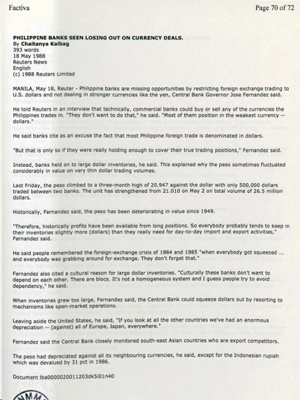PHILIPPINE BANKS SEEN LOSING OUT ON CURRENCY DEALS
[Reuters]
Published date: 18th May 1988
18 May 1988
Reuters News
English
(c) 1988 Reuters Limited
MANILA, May 18, Reuter – Philippine banks are missing opportunities by restricting foreign exchange trading to U.S. dollars and not dealing in stronger currencies like the yen, Central Bank Governor Jose Fernandez said.
He told Reuters in an interview that technically, commercial banks could buy or sell any of the currencies the Philippines trades in. “They don’t want to do that,” he said. “Most of them position in the weakest currency - dollars.”
He said banks cite as an excuse the fact that most Philippine foreign trade is denominated in dollars.
“But that is only so if they were really holding enough to cover their true trading positions,” Fernandez said.
Instead, banks held on to large dollar inventories, he said. This explained why the peso sometimes fluctuated considerably in value on very thin dollar trading volumes.
Last Friday, the peso climbed to a three-month high of 20.947 against the dollar with only 500,000 dollars traded between two banks. The unit has strengthened from 21.010 on May 2 on total volume of 26.5 million dollars.
Historically, Fernandez said, the peso has been deteriorating in value since 1949.
“Therefore, historically profits have been available from long positions. So everybody probably tends to keep in their inventories slightly more (dollars) than they really need for day-to-day import and export activities,” Fernandez said.
He said people remembered the foreign-exchange crisis of 1984 and 1985 “when everybody got squeezed … and everybody was grabbing around for exchange. They don’t forget that.”
Fernandez also cited a cultural reason for large dollar Inventories. “Culturally these banks don’t want to depend on each other. There are blocs. It’s not a homogeneous system and I guess people try to avoid dependency,” he said.
When inventories grew too large, Fernandez said, the Central Bank could squeeze dollars out by resorting to mechanisms like open-market operations.
Leaving aside the United States, he said, “If you look at all the other countries we’ve had an enormous depreciation — (against) all of Europe, Japan, everywhere.”
Fernandez said the Central Bank closely monitored south-east Asian countries who are export competitors.
The peso had depreciated against all its neighbouring currencies, he said, except for the Indonesian rupiah Which was devalued by 31 pct in 1986.






